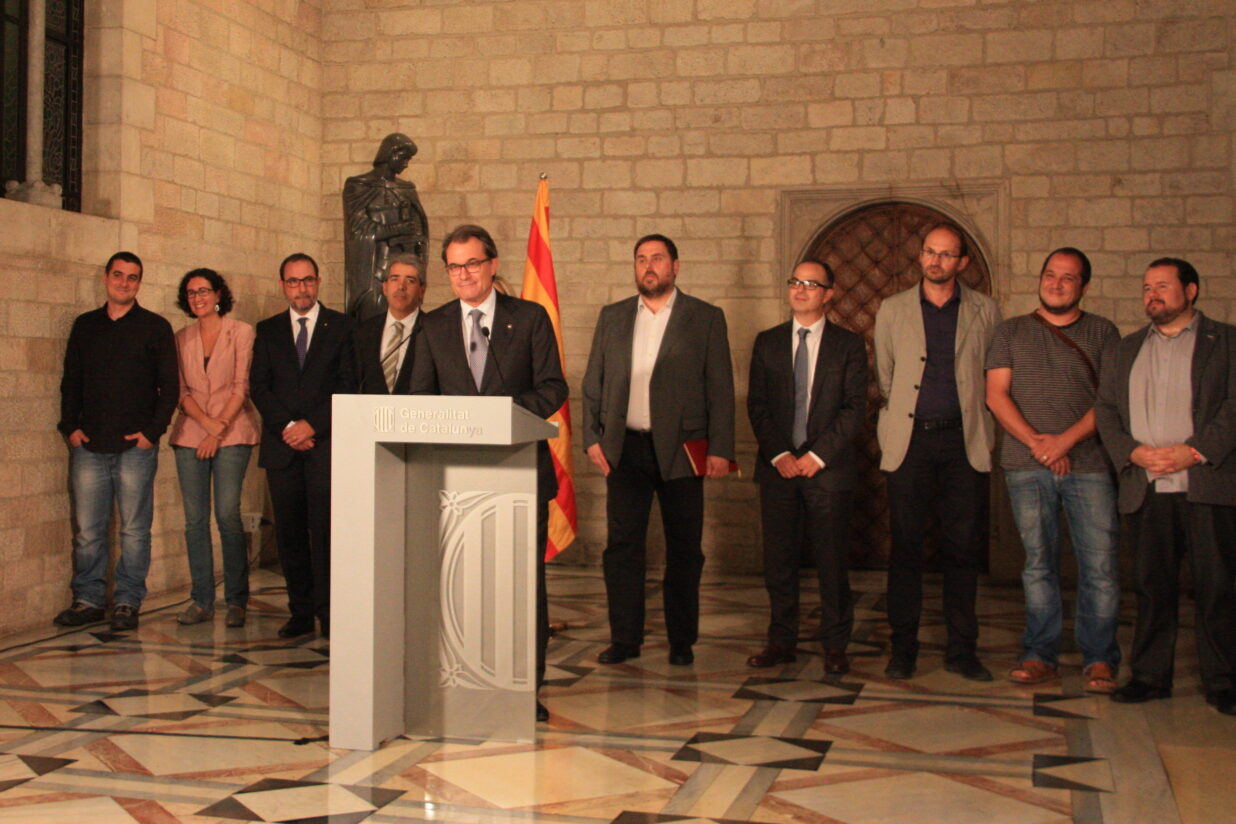04.10.2014 - 02:30
Catalan leaders on Friday decided consultation vote would proceed despite opposition from Madrid and a court injunction barring the vote. Party leaders meeting with President Artur Mas decided to maintain the scheduled Nov. 9 date for the nonbinding vote. ‘We are continuing, and we are doing it together’ said Mr. Mas after seven hours of meetings with all pro-independence leaders.
On Friday at 11am, the 6 parties supporting the self-determination consultation vote scheduled for the 9th of November started a meeting with the Catalan Government in order to agree the next steps to be taken to ensure that Catalans can vote. At the end of this edition, on Friday evening, the parties were still in the meeting. However, at lunch time (when the meeting was initially expected to end), the Minister for the Presidency and Spokesperson for the Catalan Government, Francesc Homs, addressed the press and stated that they will continue meeting in the afternoon and evening, and that they did not rule out the possibility of continuing discussions over the weekend. Despite the meeting being far from ending, Homs emphasised that all the participants had already agreed to keep the 9th of November’s call, despite the Constitutional Court’s temporary suspension of the law and the decree on which it is based. The Catalan Government and Parliament have filed allegations and they are hoping the Court will accept their arguments and lift the suspension on time.
Catalonia asks the Court to come to a decision with the same diligence it accepted the appeal
In addition, Homs asked the Court to decide on the issue quickly, as quickly as it ruled to accept the Spanish Government’s appeals. In fact the Constitutional Court organised a non-scheduled and urgent plenary meeting just 5 hours after the Spanish Government had filed its two appeals on Monday 29th of September in order to discuss their acceptance. The Court’s next regular plenary meeting was due on the 7th of October. It was the first time in the entire democracy that the Court met on a Monday and in such a short time, which somehow questions the separation of powers in Spain. The acceptance of the Spanish Government’s appeals means the immediate temporary suspension, pending a final decision that can take months or even years. Normally the Court takes weeks to accept an appeal.
In the current scenario, the main question is whether Catalan authorities will be able to organise a self-determination consultation vote on the 9th of November with enough legal and democratic guarantees, given the Constitutional Court’s suspension, the boycott of Spanish nationalist parties and the tight schedule. They have agreed to continue with the consultation vote call but it will be particularly complicated to develop the necessary legal and organisational steps with the Constitutional Court’s temporary suspension. Which gives rise to the following question: would the Catalan authorities break Spanish law in order to base their decision on the Catalan law only, this being backed by the democratic legitimacy of the Catalan people? And if so, at which point? Before or after the 9thof November? Besides, many think that the most likely scenario will be early elections organised as a plebiscite on independence.
In fact, in the last Catalan Parliament elections, held in November 2012, 80% of the elected MPs had run promising the organisation of a “legal” self-determination vote. After pressure from the Spanish Socialist Party (PSOE), the leadership of the Catalan Socialist Party (PSC) finally decided not to participate in the agreement reached in December 2013 to hold a self-determination vote on the 9th of November, 2014. Such an agreement was reached after months of waiting for an answer from the Spanish Government, who refused to sit and talk about the issue, ignoring the Catalan elections’ democratic mandate. In the last 10 months, Catalan authorities have insisted that they would be willing to reconsider the consultation vote’s exact question wording and date if the Spanish Government made its own proposal. However, the Spanish Government, through a restrictive interpretation of the Constitution (not shared by all experts) has repeated its claim that such a vote is “illegal” and has shielded itself behind a do-nothing attitude, aiming to block any movement in Catalonia.
The parties that reached the agreement in December 2013 have remained united over the 9th of November’s call, despite some public debates held in the last months. These parties represent 87 of the 135-seat Catalan Parliament, 65% of the total. The parties are the governing centre-right pro-Catalan State coalition CiU, which is led by Mas and brings together Liberals (CDC) and Christian-Democrats (UDC); the left-wing independence party ERC – which shares a parliamentary stability agreement with the CiU; the Catalan green socialist and post-communist coalition ICV-EUiA; and, the alternative left and radical independence party CUP.



